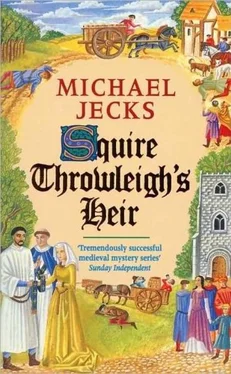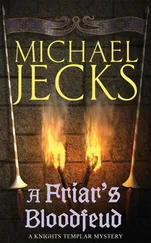‘You are sure it was them?’ she asked doubtfully. ‘I mean, what with Anney claiming she’d done it, and then there’s the priest as well…’
‘Stephen?’ Baldwin asked, and grinned. ‘No, that daft bugger didn’t lie. I think he even admitted his bad behaviour to Thomas – maybe he thought Thomas would keep him on if the priest showed he had the same sensibilities, those of a rake. No, Stephen only had the one sin to worry him: his behaviour with Petronilla. I should have realised it before, especially since I managed to offend him so much when I spoke to him in the chapel… but it’s so easy to think the worst of someone like him. He looks so effeminate, so thin and womanly; I thought that the first time I saw him, and because I didn’t want to be prejudiced, I refused to see any bad in him. That was stupid, and not a mistake I shall make again.’
‘But he used to beat the boys so badly.’
‘Yes, I am afraid that some men will; but a beating never made a child turn into a murderer, any more than it made the man who performed it become some sort of monster. I was beaten when I was young, and it never affected me; nor did my father turn into an ogre because he clouted me when I misbehaved.’
‘That’s fair enough, but what of Anney?’
‘Anney, I think, realised before any of us who was responsible for Herbert’s death. She is no fool, that woman; although she wanted to make quite sure that she wasn’t wrong, and waited until the last possible moment, I think she knew that her boy was involved. Of course, it could have been a woman…’
‘What makes you say that?’ she asked.
Baldwin smiled. ‘It was one of the first things I found puzzling when Thomas suggested that Edmund had been the murderer: a farmer like him, even one who looks fairly unfit and badly nourished, can lift much greater weights than a light boy like Herbert. If Edmund had killed Herbert, he’d have thrown the lad over his shoulder and carried him to the road; in the same way, the priest would have been able to pick up Herbert’s corpse – if Petronilla had been an accomplice, so much the better, and easier, for him. But the body was dragged. That meant it had surely to be someone who was not strong – either a particularly feeble man, a light-framed woman – or perhaps a child.’
‘Then why didn’t you arrest them immediately?’
‘Because all these things occur to me now I can look at the case retrospectively, but it’s only when the whole matter is tied up and complete that I realise how each individual aspect relates.’
‘And it was hard to believe that children could have been responsible,’ said Simon soberly.
‘True,’ said Baldwin. ‘It was the last thing I expected. I came to this matter with a conviction that I was myself culpable for not seeing Herbert’s danger, and I burned with the desire to see him avenged, but having seen one innocent child harmed, I didn’t want to believe that another boy could have been responsible.’
‘And there were so many people with motives, let alone the ability,’ commented Simon. ‘Almost everyone on the hill had time and the opportunity to murder the boy.’
‘But what I don’t understand,’ said Jeanne more quietly, casting a look at the two woebegone killers, ‘is why. They both claim that Herbert was their friend, and yet they murdered him. Why?’
Baldwin was silent, and it was left to Simon to answer. ‘Boys this young can’t always understand what is right and wrong. Neither of these lads is stupid, but they don’t necessarily comprehend what death is, or perhaps more important, how precious life is. One of them said something about Herbert complaining, threatening them with exposure, because he hadn’t fired the bullet that hit the priest. I daresay that was the crucial comment. Herbert was the son of Alan and Jordan’s master, and now he himself was their master – and he knew it. If he felt hard done by, maybe he felt justified in exposing them – after all, he had suffered on the day his father died, hadn’t he? All because the boys had been playing together. Maybe he was sick of taking the blame for everything they did as a trio and wanted to see them pay as well.’
‘Sir, we didn’t mean to kill him!’ Jordan said plaintively.
‘Was that what happened?’ Jeanne asked him.
Jordan let his head hang again. ‘He kept saying he’d see we got thrashed as well, and that we’d regret treating him so badly when he grew because he’d make us suffer then.’
Alan continued, ‘We didn’t mean to kill him, we only wanted to stop him threatening us, but then we saw we’d hurt him badly, and we got sort of panicked, because we knew we’d be in trouble if anyone saw what we’d done, so we thought we’d better make him quiet, so we hit him again, and then he stopped moving, and we didn’t know what to do.’
‘So you threw him in front of the first cart that came by?’
Jordan scowled angrily. ‘It wasn’t fair! We were just too late to throw him in front of the fishmonger’s wagon. I’d not have shoved him in front of Dad if I’d known he was coming, but we left Herbert there once we’d chucked him down. We didn’t want to be seen, not on the road with his dead body.’
‘So what did you do? Wait to see what would happen?’ Simon demanded.
Alan glanced at Jordan. ‘No, sir, we went back along the road to see if anyone was coming, and then we saw Jordan’s dad. And he saw us, too. The Fleming and his man had already ridden away, and Edmund turned back to the road ahead and saw Jordan. Bellowed what the hell was he doing up on the moor so late, and jumped down and grabbed him, catching him a right ding over the ear, so we both ran off before he could do anything else. That was why he rode over Herbert, I suppose, because he was still looking for us and not at the road.’
‘It makes sense,’ Baldwin said. ‘But didn’t you realise you shouldn’t kill another boy?’
‘Of course we did, but we didn’t mean to!’ Jordan protested. ‘We never wanted to hurt him, we only wanted to make him stop threatening us, but when we hit him he kept crying that he’d tell his mother, and then we’d suffer. All we wanted to do was shut him up.’
***
At home in Exeter once more, Thomas of Throwleigh dropped from his horse and threw the reins at the groom, then stood glowering at the men unloading the packhorses, shouting occasionally at the ones who seemed least careful about their cargo.
Not that there was much, he reflected gloomily. Since that mad bitch had burned his inheritance to the ground, there was little enough to bring home to Exeter. He shook his head, a small gesture of dissatisfied acceptance, and made his way inside.
The shutters were all wide, and the din from the street outside was deafening. Thomas filled a pint tankard with wine and wandered to the window, staring out with a bemused eye. Why did the noise irritate him so? It hadn’t bothered him before. Perhaps it was the contrast between the countryside about Throwleigh compared to Exeter, he thought, and kicked the nearest shutter closed.
‘Nick! I…’ He stopped. There was no point calling for him. Thomas found his resentment increasing. No hall, no money, and now no Nicholas; his whole life had been turned upside-down, on the promise of a manor with its huge hall and vast lands. Instead, here he was with his old place, mortgaged to the hilt and beyond, and without his best servant.
He fell backwards into his chair and drummed his fingers on the arm while he glared about the room with the embittered conviction that he had lost everything. There was nothing to be retrieved; no way to make an income.
‘Bring me my secretary!’
Unless, of course, he could make Throwleigh pay for itself…
Читать дальше












